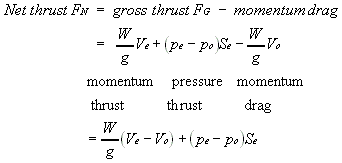 |
|||||
| Home | Research | For Teachers | HISTORY Level 1 Level 2 Level 3 |
PRINCIPLES Level 1 Level 2 Level 3 |
CAREER Level 1 Level 2 Level 3 |
| Gallery | Hot Links | What's New! | |||
| Web Administration and Tools | |||||
 |
|||||
| Home | Research | For Teachers | HISTORY Level 1 Level 2 Level 3 |
PRINCIPLES Level 1 Level 2 Level 3 |
CAREER Level 1 Level 2 Level 3 |
| Gallery | Hot Links | What's New! | |||
| Web Administration and Tools | |||||
![]()
Thrust is the force that provides the forward motion of the airplane through the air. There are several ways to produce this force—jets, propellers or rockets— but they all depend on the principle of pushing air backward with the object of causing a reaction, or thrust, in the forward direction. The effect is the same whether the thrust is produced by a propeller moving a large mass of air backward at a relatively slow speed or by a jet moving a small mass of air backward at a relatively high speed.
For jet aircraft, the means of thrust is the gas turbine engine. The figure below
shows the inlet and exhaust flows of the turbojet. The negative thrust due to bringing the
freestream air almost to rest just ahead of the engine is called momentum drag or ram
drag. The resulting thrust is given by following equation,

Schematic of a turbojet engine.

where: ![]() = is weight flow rate of the air passing through
the engine.
= is weight flow rate of the air passing through
the engine.
![]() = jet stream velocity
= jet stream velocity
![]() = static pressure across propelling nozzle
= static pressure across propelling nozzle
![]() = atmospheric pressure
= atmospheric pressure
![]() = propelling nozzle area
= propelling nozzle area
![]() = aircraft speed
= aircraft speed
The information in this section has been extracted from several sources. Those sources have been contacted and permission to use their material on our site is pending. However, the format in which this material has been presented is copyrighted by the ALLSTAR network.
Send all comments to ![]() aeromaster@eng.fiu.edu
aeromaster@eng.fiu.edu
© 1995-98 ALLSTAR Network. All rights reserved worldwide.
Updated: February 23, 1999